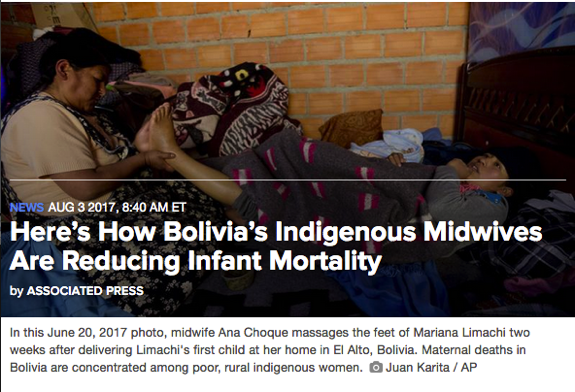
August 3, 2017 - NBC News
by Associated Press
EL ALTO, Bolivia — Mariana Limachi left the hospital in this high Andes city in tears after a doctor told her she needed a C-section because the umbilical cord was wrapped around her 8-month fetus.
Instead, she turned for help to a highly respected figure among Bolivia's indigenous women: the midwife. A few weeks later, midwife Ana Choque, an Aymara woman, delivered Limachi's first son at her home using sunflower oil, paper napkins and coca leaves.
After decades of shortages of trained people to help in deliveries, the role of midwives has been growing in recent years in Bolivia, which joined international efforts to improve the skills of midwives and bring them into closer contact with the medical community.
Aymara and Quechua indigenous groups make up a majority of the country's population, and many indigenous women like Limachi distrust hospitals and cesarean births. They prefer to rely on traditional midwives, who they often refer to as "aunt."
Led by Bolivia's first indigenous president, Evo Morales, the government has tapped into this strong cultural bond to train about 500 midwives and improve their medical skills. It is incorporating them into the health system as it strives to lower Bolivia's maternal mortality, which is the highest in South America and among the highest in the Western Hemisphere.
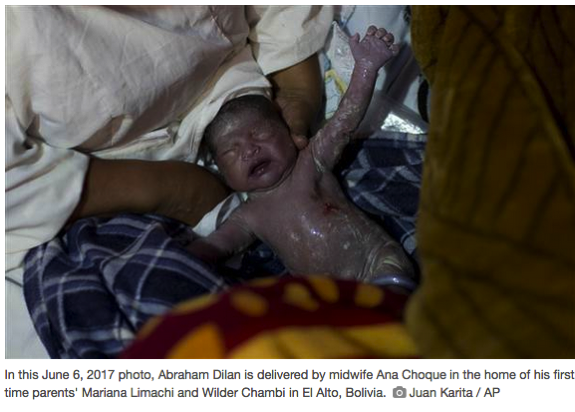
The midwife training program is partially financed by the U.N. Population Fund, which has supported similar initiatives in Bolivia previously.
The current program officially began in 2013 after Bolivia passed a law recognizing traditional indigenous medicine, including midwifery. But training has accelerated in recent months as more midwives have joined the staff at clinics and have been allowed to certify births when they deliver babies in distant rural areas.
Their lessons include dealing with emergency situations such as how to disinfect wounds or the best way to prepare a woman to be safely taken to a hospital in case of an uncontrollable hemorrhage.
Choque is one of 22 women among the group who have so far passed an exam to get officially qualified by the health ministry.
The 58-year-old midwife learned the trade from her grandmother when she was 15. In the four decades since, she says, she has delivered more than 3,000 babies.
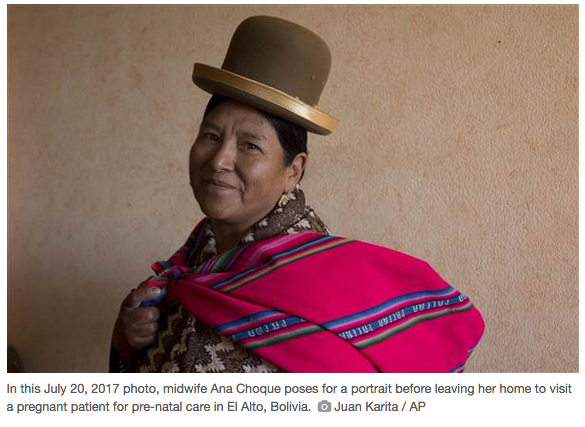
"I saw the miracle of life and that turned me into a midwife," Choque said.
Bolivia long tried to convince women about the need to get pre-natal care at health clinics and give birth at hospitals. In 2009, the government even offered pregnant woman a $247-a-year financial incentive.
Despite that, authorities say, the number of maternal deaths remained practically unchanged, around 206 per 100,000 live births in 2015. Only Guyana and Haiti have a higher rate of maternal deaths in the hemisphere, the U.N. Population Fund says. By contrast, Finland recorded three deaths per 100,000 births in 2015, and the U.S. had 14.
Maternal deaths in Bolivia are concentrated among poor, rural indigenous women, who are among the most vulnerable. Critics say Bolivia's public health centers and hospitals in rural areas often lack beds, doctors and medicines.
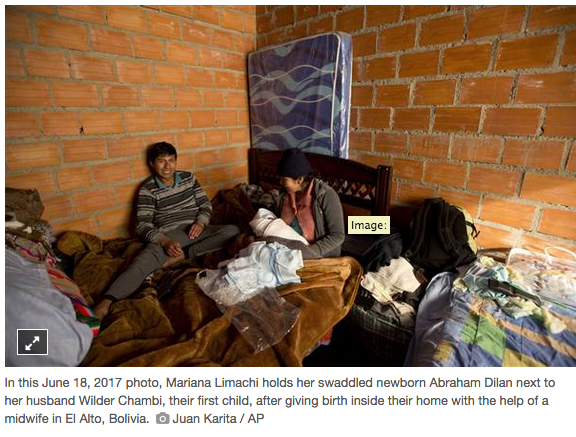
"An equally important factor is the fact that indigenous women who have managed to get to clinics have often been treated as second-class citizens, scorned because of their gender, their ethnicity and their traditions," the U.N. body said in a 2009 report.
The government's midwifery training program takes into account deeply rooted cultural traditions and the value of women who travel to distant areas that lack hospitals or doctors, said German Mamani, deputy minister for traditional medicine.
"There are very remote places where it could take them (medical professionals) days to arrive," Mamani said. "But a midwife is on site, saving lives."
The World Health Organization says that "decades of neglect of the role of midwives, either because of the over-medicalization of pregnancy care or a lack of resources, has left a legacy of high rates of maternal and newborn mortality in developing countries."
Globally, 289,000 women died from childbirth complications in 2013. Nearly 3 million newborns die in the first month of life and 2.6 million newborns are stillborn each year. The U.N. health agency says implementing quality midwifery services could prevent about two-thirds of those deaths globally.
The most recent investigation carried out by Bolivia's health ministry in 2011 said about 42 percent of the country's maternal deaths happen in home deliveries. One of the top causes is that women are aided by untrained people, including their partners or family members, it said.
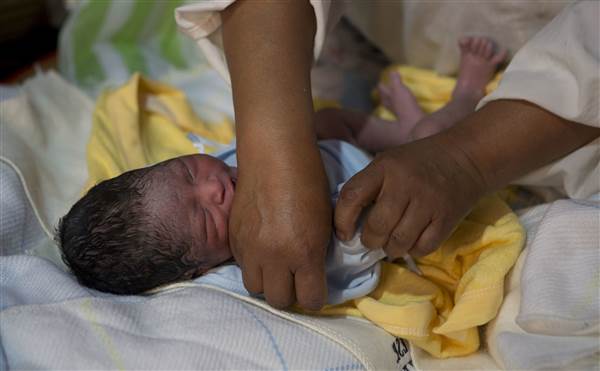
"Midwives are already saving lives," said Fernando Leanes, a WHO official in Bolivia. "But we could reduce the number of maternal deaths at home if more of them arrived to other homes knowing how to do their jobs right."
After Limachi was told by a doctor that she needed a C-section, she sobbed uncontrollably all the way to a small shop where she sells disposable dishes in El Alto, the sprawling sister city of the Bolivian capital, La Paz. One of her clients advised her to seek a midwife.
Choque gave Limachi massages to move the baby in the womb in preparation for the birth. When labor began, Choque took her time because she knew it would be several hours until the birth, which was witnessed by two Associated Press journalists.
Twelve hours later, contractions were coming every two minutes. "Aunt, it hurts! I can't take it any longer!" a pale-faced Limachi told Choque, who gave her coca leaves to chew and calm the pain.
After some minutes, the baby was born. Limachi saw tears of joy on her husband's cheeks and became worried, asking him if everything was fine. A long silence finally ended when Choque lightly spanked the baby's bottom, causing him to cry.
Limachi says she could not be more grateful to her midwife: "Aunt Ana has been an angel sent to save us."